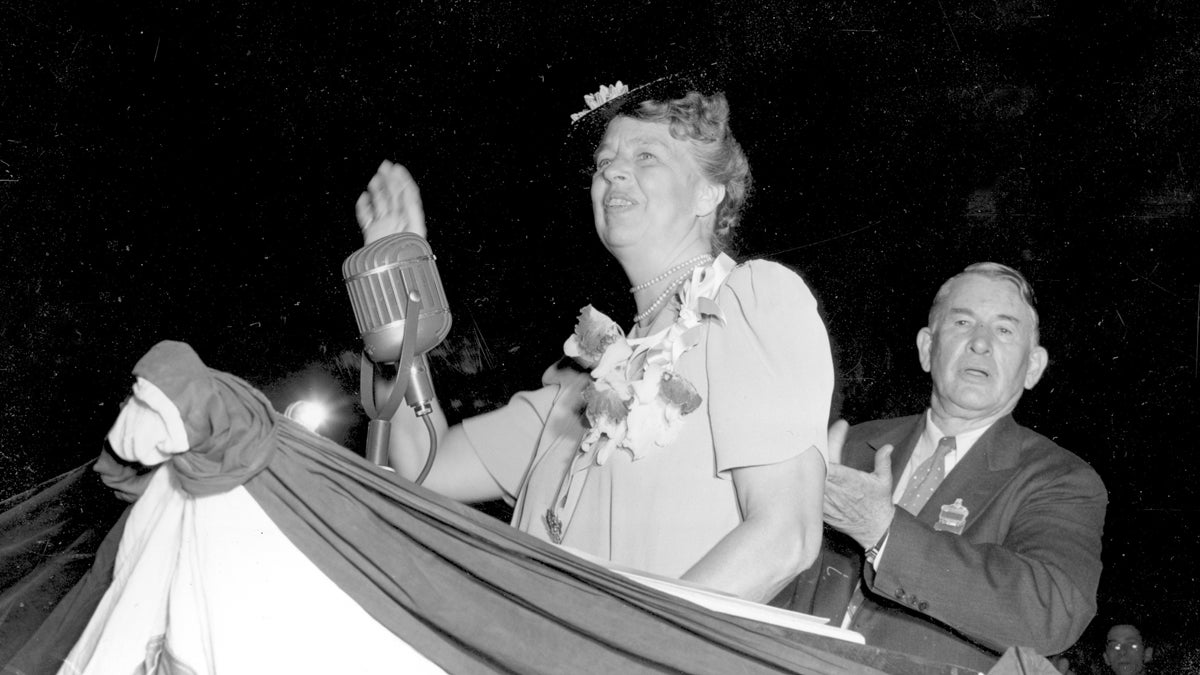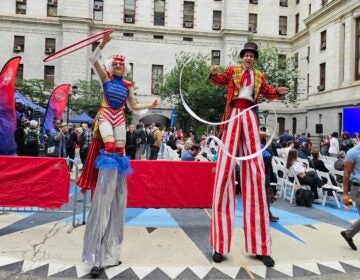In praise of eloquence

U.S. First Lady Eleanor Roosevelt waves as she acknowledges a standing ovation after she addressed the Democratic National Convention at Chicago, Ill., July 18, 1940. (AP Photo, file)
Silence, far from being golden, is the terror of modern communication. For those of us forced to endure the prattling of people who, having nothing to say, insist on saying it anyway, some carefully doled out oratory is refreshing.
David Bailey, the fourth Baron Glanusk (1917-1997) reportedly waited more than 25 years before making his first speech in the British House of Lords. It’s not known what deeply held imperatives prompted this hardly garrulous aristocrat to unburden himself; but it’s tempting to think that he might have risen unsteadily to his feet after a further quarter century only to offer a laconic ” As I was saying …”
But we might have something to learn from Lord Glanusk: For those of us forced to endure the prattling of politicians and committee members who, having nothing to say, insist on saying it anyway, his carefully doled out oratory is refreshing.
Silence, far from being golden, is the terror of modern communication. Gaps of more than a few seconds in the endless blather of radio and television are considered a defeat; stopping to think is increasingly taken to mean that the well of thought has run dry, and the chance thereby provided for others to fill it with frothing pails of non sequitur and irrelevance.
In our egalitarian society, everyone must be allowed their say; all must have equal time. The ringing oratory of a Churchill, a Martin Luther King, or an Eleanor Roosevelt, the articulacy of a William F. Buckley or the ordered philosophic pronouncements of a Bertrand Russell — all must be cut short by the modern chairman in favor of the incoherent ramblings of the man in the street, who, temporarily tiring of that location, has taken his place at the committee table or, worse still, in Congress.
A former Canadian minister of health, responding to an opposition question about the apparent arbitrariness in the endless debate over adjustments to the country’s national health care, stated that the public is tired of talk; it wants action. Well, the public can hardly be tired of talk if it doesn’t hear any, or if it hears all too seldom the music of eloquence.
As Ben Jonson put it: “To speak and to speak well, are two different things.”
Our schools dispense Shakespeare like castor oil, and grammar and syntax like crumbs; no wonder students emerging from them have to take courses in remedial English. Both television and radio pour forth an endless stream of linguistic vapidity. Nowadays, to be eloquent is to be effete.
The late Edwin Newman, author of two bestsellers on English usage, “Strictly Speaking” and “A Civil Tongue,” believed that all the flavor and color and eloquence of the English language are being squeezed out by sociologists, lawyers, physicians, bureaucrats, and, for that matter, journalists. So where does it all start? Are schools failing to teach kids the rules of language? Are adults reading less? Has television made us lazy about conversation and communication?
In many cases, Newman thought, it’s a lack of vocabulary. There are a great many people who simply do not have the resources with which to express themselves. That is why they’re constantly saying “you know” and peppering their sentences with the ubiquitous “like.” There’s a sense, he said, that you don’t have to communicate with language any longer. You can use emoticons. You can use tweets. You can use obscenity.
The answer to all this might indeed be teaching students — and teaching the teachers — eloquence. Or at least a respect for the wonders and beauty of language and its use in expression. Another solution might be ridicule, so that when Donald Trump talks in largely unfathomable convolutions and endless hyperbole, his peers should laugh, not shake his hand.
Lord Glanusk, perhaps heeding the admonition that to say nothing and be thought a fool is preferable to saying something and proving it, still has a lesson for all of us. Having nothing to say, he said nothing. His silence was eloquent.
WHYY is your source for fact-based, in-depth journalism and information. As a nonprofit organization, we rely on financial support from readers like you. Please give today.





